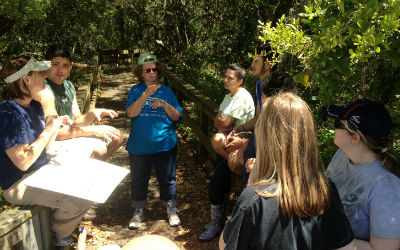ATLANTIC BEACH — A special group of seven high school students from the N.C. School for the Deaf in Morganton got to spend several hours last week enjoying and learning about the coastal wetlands at Hoop Pole Creek, the N.C. Coastal Federation’s preserve.
“The kids really enjoy it,” said Jana Lollis, the students’ science and biology teacher. “Hands on learning is good for all kids but I think it is especially for these kids. Many of the kids’ parents can’t sign and one of the students is from Honduras and at first couldn’t speak English or sign.”
Supporter Spotlight
Sarah Phillips, a federation educator, led the tour that began with some basics about Hoop Pole Creek, wetlands and the various habitats at the preserve. With the aid of a white board and markers, Phillips was able to depict Bogue Banks, the Atlantic Ocean, the sound, maritime forest and the importance of caring for the wetlands.
“I have never taught a class of hearing-impaired kids before, though I have helped with this type of class before when I was in the Peace Corps in Slovakia,” Phillips said later. “My cousin is also hearing impaired so I knew what types of things they may or may not be able to do. I really wasn’t sure how to prepare, but really didn’t do much that I would not have done with any other group of students. The translation to sign language and back to spoken word added a little bit of time to the lesson, but overall it was pretty much the same as it would have been with any high school class.”
 Sarah Phillips, far left, talks about the ecology of maritime forests to students at the N.C. School for the Deaf. Photo: April Clarke |
Lollis is also hearing impaired but reads lips and signs. She and two chaperones from the school helped to translate, and the result was the students learned about the maritime forest, the special adaptations the trees must adopt to survive the salty coast. The students also got the opportunity to do various tests in the creek. They checked the clarity or turbidity, salinity, oxygen, nitrates and pH using the equipment Phillips brought. The kids particularly enjoyed finding and playing with the fiddler crabs and wanted to take home some oysters and mussels to taste for dinner.
Phillips said she was glad Lollis emailed her and gave her the opportunity to conduct this particular class. “Since this school is from Morganton and most of the kids are from the western part of the state, giving them the opportunity to explore a little bit worked well,” Phillips said. “We walked around in the salt marsh and caught fiddler crabs and looked at oysters and talked about birds that were swooping down into the water catching fish. Anytime they found something new or different or interesting, they’d wave me over and we’d figure it out.”
Lollis said some of the students have never been to the beach before. On the three-day trip, they also visited the N.C. Museum of Natural Sciences in Raleigh, the N.C. Maritime Museum in Beaufort and camped one night at the Cedar Point Recreation Area in the Croatan National Forest and two nights at Cape Hatteras.
Supporter Spotlight
Audrey Garvin, director of the school, doesn’t consider the trip to be days out of the classroom. “The opportunity to explore coastal North Carolina is not time out of the classroom—it is real world learning at its best,” she said. “(The school) looks forward to providing a great curriculum for great kids and teachers in natural settings.”
She said experiential learning is the best type of education. “Being led by strong, deaf teachers, the in-depth communication in a real world setting has benefits that translate into stronger conceptual development,” she explained. “Using texts does not produce the same English comprehension and does not result in higher achievement.”
Ann Aldridge, secretary of the N.C. School for the Deaf in Morganton Foundation and retired school administrator added “utilizing all senses to enhance learning is especially important for students who have hearing losses. Being able to actually experience the lessons taught in the classroom through hands-on ‘real life’ interactions raises the comprehension and cognitive levels significantly.”
The foundation, a volunteer organization, provided the money for the trip.
The school was started in 1891 in Morganton, about a five-hour drive from the coast. It is a day and residential school whose mission is to educate children who are deaf or hard of hearing.







